June 17, 2025 | 19:12 GMT +7
June 17, 2025 | 19:12 GMT +7
Hotline: 0913.378.918
June 17, 2025 | 19:12 GMT +7
Hotline: 0913.378.918
That was the scene at Nguyen Duc Huy's Viet Hydroponic Cooperative in Ward 10, Da Lat City (Lam Dong). The place was under preparation to conduct agricultural experiences not only for healthy people but also for people having to stay in wheelchairs. This was considered a pioneering model in Vietnam. The plant physiology master was originally an employee of the Da Lat Economic Department, but in 2015 Huy went out to work as a farmer with the desire to contribute more to society. He had been studying hydroponic systems since his 3rd year of university until then.

Director of Viet Hydroponic Cooperative Nguyen Duc Huy describes wheelchair access at his farm. Photo: Duong Dinh Tuong.
Huy confided, "In the past, people used to consider farming as the poorest profession of society - a job for the unsuccessful and incompetent. Right here in Da Lat city, my friends were farmers' children, when going to Ho Chi Minh city to study they had this mentality of escaping from agriculture. They wanted to work in an office sitting in air conditioning and later on. Most of them did. But in terms of wealth accumulation, not all office workers can be like today's farmers."
Back to the story of why farmers' children didn’t want to be farmers, it was because of their experience farming the old-fashioned way. In the 1990s, at 4 - 5 am an 8 - 9 year-old boy had to get to the pump and water all the trees in the big garden. It was always freezing at that time of the day, thus those memories were deeply imprinted in people's heads: being a farmer was arduous work, and they had to escape from agriculture at all costs.
But in many places today farmers do not have to touch the ground with their feet because the soil is already covered with canvas. Farmers’ mindset is also completely different. You can only become a farmer if you have the knowledge, not just by learning at school but also from other sources. Particularly in Da Lat, if you want to be a farmer, you must have capital and land as the land here is calculated in square meters, and the price is high. It is not an easy matter.
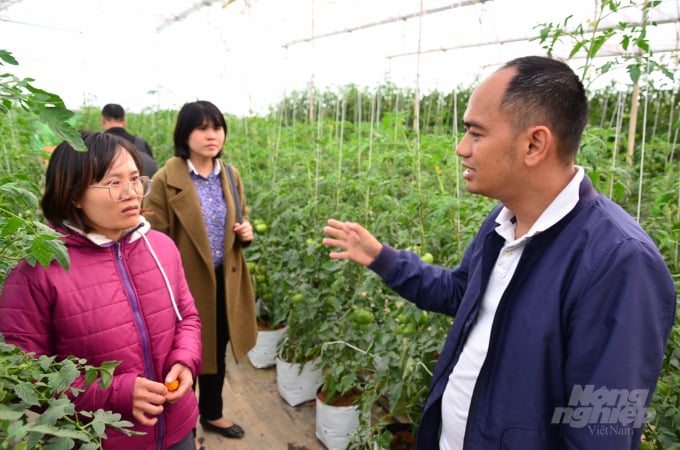
Nguyen Duc Huy talking with agricultural extension officers of Lam Dong province. Photo: Duong Dinh Tuong.
“We set up a cooperative club to support each other's inputs, outputs, and techniques. Da Lat farmers are eager to learn, almost everyone wants to apply new techniques. Whenever they hear that there are foreign experts, they will participate in the training courses a lot. However, the inherent weakness is the lack of interpreters with expertise in agriculture, so when experts say one thing, sometimes people go back and do something else. And when they don't get results, they get bored quickly," said Huy.
From the initial acreage of 2,000 m2, now Viet Hydroponic Cooperative has 3 ha with 1 ha belonging to Huy himself. All of the plants are grown in polyhouses. Huy said that the reason for choosing hydroponics was because as a new generation farmer, he did not have time to accumulate land so he had to think of a way to apply science and technology in order to create a large output on a small area. Here the cooperative simulated nature by calculating how much fertilizer a plant needed to grow, how much dissolved oxygen was required, how not to poison the plants and not leave behind residues.
In the beginning the automatic irrigation system was designed to water according to light and humidity, but in the last two years he had come to realize many things about this model, so he immediately changed the algorithm, watering according to the evaporation rate of leaves and the nutrient absorption rate of roots. All can be measured using machines. Thanks to the algorithms the computer will calculate the specific level for the tree’s factors.
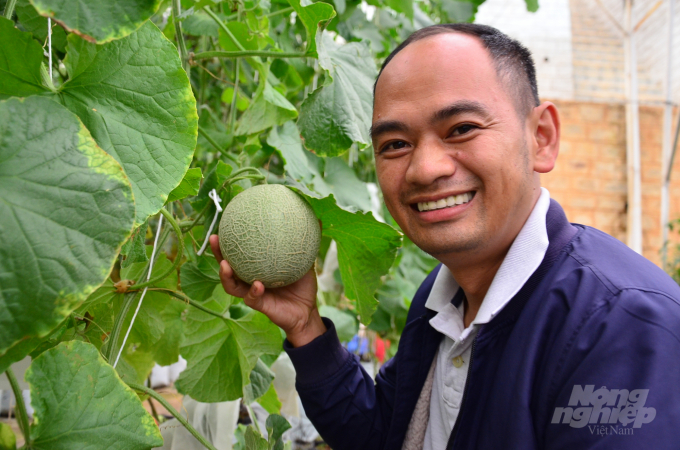
Nguyen Duc Huy giving an introduction about his cantaloupes. Photo: Duong Dinh Tuong.
According to Huy, agrotourism is still full of potential, but there are some policy barriers such as not being allowed to build houses on agricultural land. Therefore, the cooperative will develop a model that leans more toward experience than accommodation, focusing on families who want to let their children experience farming or families with elderly people in wheelchairs. The garden will be designed with runways so that the vulnerable can also have the same experience as normal people, going in and out without anyone's help.
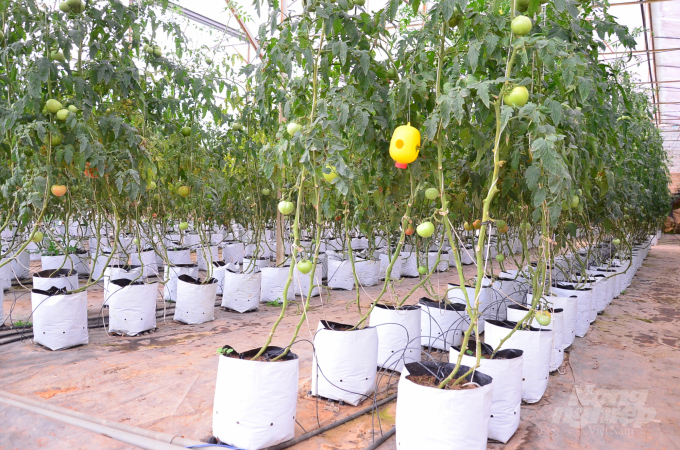
The irrigation process is fully automatic. Photo: Duong Dinh Tuong.
“Disabled people often have low self-esteem, so they don't like anyone to serve them. Cars can bring them to the farm gate, and from there the road into the garden is very wide. There is a separate toilet for wheelchair users. When the model comes into operation, the elderly and wheelchair users will be able to visit normally, not to mention there will be someone cooking on-site. There is also an experience area selling seedlings for children to grow themselves or send back here to take care of, an area for adults to take pictures, check-in, and make vegetable dolls on-site.”
“How can you tell whether people in wheelchairs have a need to visit the garden?” I asked. Huy said, “Since I travel a lot, I have many relationships, including the elderly. When my friends get older, their family members get even older. No one has ever thought of agrotourism for the disabled so there are no farms that offer this kind of service, even overseas, according to my knowledge.
“The market for this branch is very small, but if we can make the most of it, this model will bring great value. I have made a survey on the senior guests and their family members who are unfortunately disabled, many claims to be too busy to take care of the elderly but have to hire people for support. When I went to receive guests, I saw those disabled people just hanging around the hotel with someone watching over them. If they could visit and play around the garden, they would definitely feel happier.”
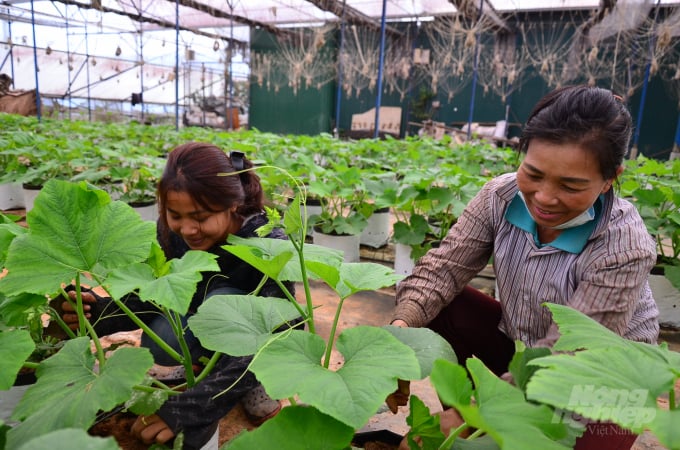
Laborers at the cooperative working and singing at the same time. Photo: Duong Dinh Tuong.
Translated by Samuel Pham
![Turning wind and rain into action: [5] Hue applies modern technology in disaster forecasting](https://t.ex-cdn.com/nongnghiepmoitruong.vn/608w/files/news/2025/06/17/z6704423696987_15fd32ffc26d590d204d520c9dac6786-nongnghiep-093938.jpg)
(VAN) In Hue city, modern technology has recently been applied in meteorological and hydrological forecasting and warning, helping to reduce the damage caused by natural disasters.

(VAN) A cutting-edge farming technique being implemented on an experimental ranch in Arizona's Sonoran Desert has already saved a billion gallons of water over five years, according to Civil Eats.

(VAN) Poultry and pig production and the environment can be boosted through enhanced water technology, according to new research.
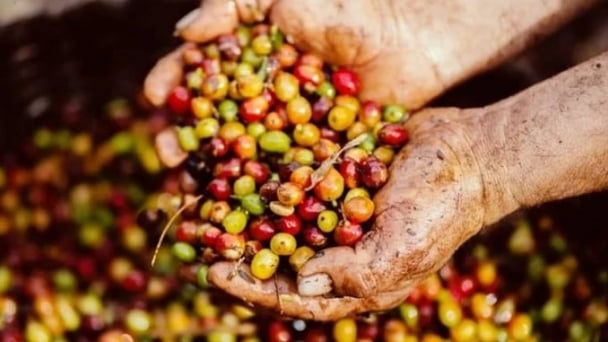
(VAN) Coffee prices on June 16, 2025 are unchanged. In Vietnam, local trading prices are holding steady, ranging around VND 112,000 – VND 112,500/kg.
![Turning wind and rain into action: [4] Bringing climate bulletins to remote and isolated areas](https://t.ex-cdn.com/nongnghiepmoitruong.vn/608w/files/linhnhp/2025/06/14/1152-z6704423696987_15fd32ffc26d590d204d520c9dac6786-nongnghiep-151141.jpg)
(VAN) The Vietnam Agriculture and Nature Newspaper interviewed Mr. Vu Thai Truong, Acting Head of Climate Change and Environment at UNDP Vietnam, to gain deeper insight into how climate bulletins are delivered to farmers.

(VAN) In Tien Giang, a high-tech shrimp farm has developed a distinctive energy-saving farming model that has yielded promising results.
![Turning wind and rain into action: [3] 300.000 farmers benefit from agro-climatic bulletins](https://t.ex-cdn.com/nongnghiepmoitruong.vn/608w/files/news/2025/06/12/e5a48259d6a262fc3bb3-nongnghiep-125122.jpg)
(VAN) The agro-climatic bulletin has become a valuable tool for farmers in the Mekong Delta. After more than five years of implementation, the initiative is gradually being expanded nationwide.